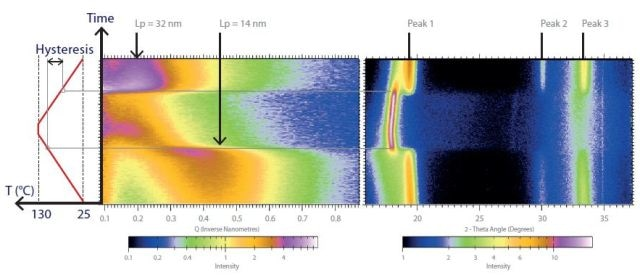通常,聚合物在整个制造过程中都会经历许多热变换 - 从反应堆中的合成到诸如膜形成或注射成型等产品形成过程。淬火也可能是处理的重要一步,例如,保留平衡相位或特定的纳米结构方向。
同时进行小角度/广角X射线散射(萨克斯/蜡)是用于分析这些材料的必不可少的工具,因为聚合物可能会自组织成宽尺寸范围的结构,从原子量表到几十纳米亚博网站下载。
Throughout thermal processing, simultaneous data collection can be especially informative as it allows dynamic in-situ multi-scale examination of the nanostructure, in addition to the crystalline phase, enabling the route of phase transformation to be examined.
Measurements and Results
Using the Xeuss 2.0 SAXS/ WAXS system in simultaneous SAXS/WAXS mode, a 20 µm solvent cast thick film of fluoropolymer was measured. The system was heated from room temperature to 130 °C at 1 °C/minute using an integrated temperature control stage (Linkam HFSX350).
The sample had not previously been heated. SAXS and WAXS data was gathered side-by-side with a dual detector set-up. It is known that during thermal processing, this particular fluoropolymer undergoes a ferroelectric to paraelectric transition, known as the Curie transition. This is a reversible transition, but the sample only has to be stabilized once.

Figure 1.Simultaneous SAXS (left) and WAXS (right) study of a fluoropolymer film during first heating and cooling. Ramp at 1 °C/min (far left). 2D representation of SAXS and WAXS 1D curves as a function of temperature. Each horizontal pixel line corresponds to a 1D curve.
Figure 1 shows the resulting 1D SAXS and WAXS curves as a function of temperature. These results supply data on the lamellar phase nanostructure in addition to the crystalline phase evolution as a function of temperature.
蜡数据清楚地证明了过渡的可逆性,因为结晶峰保持在同一位置。从SAXS数据可以看出,长时间在第一次超过居里温度后从14 nm移动到32 nm。
In the following thermal cycles, no further shift of the long period is seen. So, it is inferred that stabilization was acquired after the first thermal cycle, after which the phase transition becomes completely reversible.
结论
With the help of theXeussor theNano-inXider SAXS/WAXS systems,聚合物膜的原位实验是热处理的函数,以前只能在同步加速器束线上进行1,2, can now be conducted in the laboratory.
XENOCS SAXS/WAXS系统允许使用特定的环境控制阶段(例如湿度控制阶段或拉伸细胞)进行大量的动态和动力学内尺度研究。
References and Further Reading
- P. Panine et al., Polymer, 2008, 49, 676-680
- Wang et al., Macromolecules, 2000, 33, 978-989

This information has been sourced, reviewed and adapted from materials provided by Xenocs.
For more information on this source, please visitXENOCS。